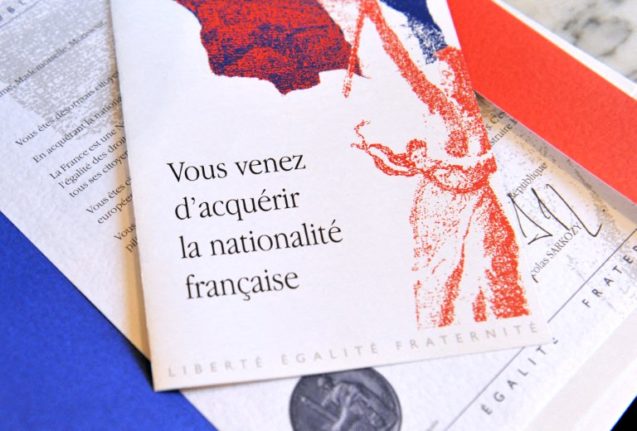Who is eligible?
Children who are born to at least one French parent can become French from birth.
Conversely, if you arrive in France with young children in tow, those children will have to wait until they’re adults and apply in their own right, via the traditional and frustratingly slow-moving application process. In theory, applications may be submitted from the age of 17 – but the online application process does throw up several obstacles, not least obtaining a recognised online ID, which requires the applicant to be 18.
The droit du sol applies to children who are born in France to foreign parents.
Despite it often being described as an automatic right, there are in fact conditions attached, and the child only becomes French if they are their parents make the application.
When to apply
Children born in France must wait at least 13 years – those who have lived in the country for several years may get citizenship from age 13, with the permission of their parents, or they can apply on their own behalf from age 16.
READ ALSO French citizenship: What exactly is France’s ‘droit du sol’?
Conditions
As well as being born in France, to qualify for this route to citizenship, the child must:
- live in France at the time of the application;
- have been ordinarily resident in France for at least five years, if the applicant is aged 16 or over;
- or, for applicants aged 13 to 16, have been ordinarily resident in France since the age of eight.
So basically it’s not enough to have been simply born in France, the child must have spent a significant part of their early life here too.
The process
For those who meet the criteria, the process is thankfully quicker and more straightforward than the one for adults.
It involves gathering together a few documents and handing them in at your nearest tribunal judiciaire (you can find the one nearest you here).
A matter of weeks later, you will receive by post an invitation for both child and parents to attend an appointment to finalise the application. Once finalised, the child is considered French.
They are entitled to a French identity card and a French passport – but both of these must be applied for separately by either the child or their parents (depending on age), they’re not handed over as part of the citizenship application.
The documents
Like all French official processes, you will need a dossier of documents.
- a certified copy of the child’s French birth certificate that is less than three months old. Get one of these by contacting the mairie office in the town where their birth was registered – you may even be able to apply online via the mairie website;
- proof of address that’s less than three months old – a gas or electricity bill, for example (be aware a phone bill or a bank RIB is not considered proof of address);
- for any applicant under the age of 16, a copy of their parents’ marriage certificate – and divorce certificates, if applicable. If the marriage/divorce certificates are not in French, you will need to provide certified translations
- photocopies of the parents’ titres de sejour (front and back), or identity cards/ passports;
- ID for the child, such as their passport;
- a passport photograph of the child, with their name written clearly on the back;
- passport photographs of the child’s parents, with their names written clearly on the back;
- A recent certificate de scolarité confirming the child’s education in France for the previous six years. Schools can supply these.
Note, if the child applying for naturalisation has children of their own, birth certificates of their children will also be required. The reason for this is that they, too, will become French at the same time, if the application is accepted.
Children who have reached the age of 16 when they apply do not need to involve their parents in their application, if they meet the requirements. But they need to supply all other required documents.
What next
Once you have assembled the relevant documents, you can either post or take these documents to your nearest tribunal judiciaire. If you do hand them in personally, an official will check that they have everything they need, which could make the time spent making the trip worthwhile.
Then, it’s simply a case of waiting for the letter to arrive, and attending the appointment at the right time.
Judicial authorities have six months to register the declaration, or refuse the application. They can change their mind after two years if they discover retrospectively that the legal conditions for nationality are not met or if you have lied on the form.
If the request for nationality has been refused, you can contest it in the six months following the decision. You will need to hire a lawyer to do so.
The appointment
When you are called to the appointment at your nearest tribunal judiciaire, you need to take the letter confirming the date and time of your rendezvous, plus photo ID for the child applying for nationality, and parents if the child is under the age of 16. Passports and / or cartes de séjour are ideal. Under normal circumstances, both parents are expected to attend.
In the first instance, the child will be taken into a private room and spoken to on their own, to confirm that they want to become French, before the parents are invited in to also confirm they are happy for their child to have French nationality, and fill in a couple of forms.
At this time, the child will also be asked if they would like to take a more ‘French-sounding’ first name, and if they would like to also keep or renounce their existing nationality. Both involve extra processes and – in most cases – both are optional.
Upon completion of the interview, you will be handed a small dossier of documents, including the all-important naturalisation document (which you must keep under pain of major future administrative issues), allowing you to apply for a national ID card on behalf of your child, and a passport.
READ ALSO The ultimate guide for how to get French citizenship
Over 18s
Anyone born in France to foreign parents, can apply for citizenship in their own right once they reach adulthood, if they meet the following conditions:
- live in France at the age of 18;
- live in France regularly for a period of at least five years since the age of 11;
- parents are not diplomatic agents or consulate staff.
Officially, if you meet the above criteria, you become French automatically at the age of 18.
But you still need to apply for a certificat de nationalité française at the age of 18. To do this, you will need to present proof that you have lived in France regularly for a period of five years since the age of 11 (school certificates, work contracts et cetera).
READ ALSO Can you be stripped of French citizenship?



 Please whitelist us to continue reading.
Please whitelist us to continue reading.
Member comments